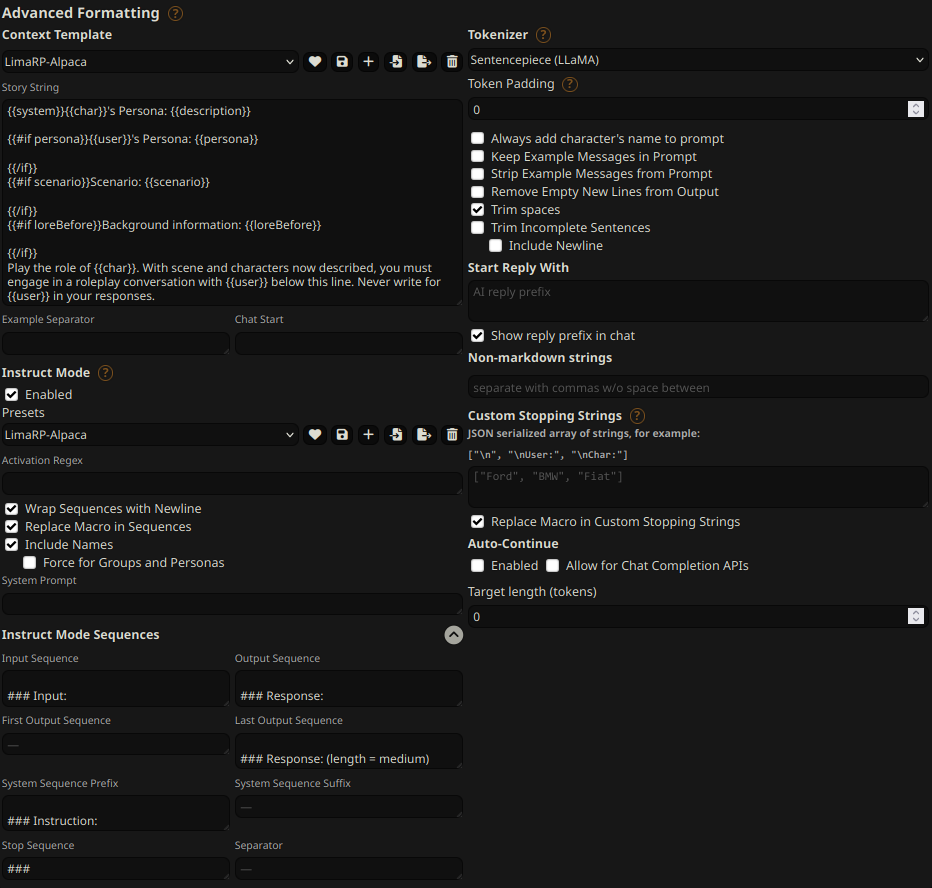LimaRP-Mistral-7B (Alpaca, flipped instruction experiment)
This is a version of LimaRP for Mistral-7B-v0.1 with about 2000 training samples up to 9k tokens length. The second training epoch used a differently arranged system instruction.
For more details about LimaRP, see the model page for the previously released v2 version for Llama-2. Most details written there apply for this version as well. Generally speaking, LimaRP is a longform-oriented, novel-style roleplaying chat model intended to replicate the experience of 1-on-1 roleplay on Internet forums. Short-form, IRC/Discord-style RP (aka "Markdown format") is not supported yet. The model does not include instruction tuning, only manually picked and slightly edited RP conversations with persona and scenario data.
Prompt format
Same as before. It uses the extended Alpaca format,
with ### Input: immediately preceding user inputs and ### Response: immediately preceding
model outputs. While Alpaca wasn't originally intended for multi-turn responses, in practice this
is not a problem; the format follows a pattern already used by other models.
### Instruction:
Character's Persona: {bot character description}
User's Persona: {user character description}
Scenario: {what happens in the story}
Play the role of Character. You must engage in a roleplaying chat with User below this line. Do not write dialogues and narration for User.
### Input:
User: {utterance}
### Response:
Character: {utterance}
### Input
User: {utterance}
### Response:
Character: {utterance}
(etc.)
You should:
- Replace all text in curly braces (curly braces included) with your own text.
- Replace
UserandCharacterwith appropriate names.
Message length control
Inspired by the previously named "Roleplay" preset in SillyTavern, with this version of LimaRP it is possible to append a length modifier to the response instruction sequence, like this:
### Input
User: {utterance}
### Response: (length = medium)
Character: {utterance}
This has an immediately noticeable effect on bot responses. The lengths using during training are:
micro, tiny, short, medium, long, massive, huge, enormous, humongous, unlimited.
The recommended starting length is medium. Keep in mind that the AI can ramble or impersonate
the user with very long messages.
The length control effect is reproducible, but the messages will not necessarily follow lengths very precisely, rather follow certain ranges on average, as seen in this table with data from tests made with one reply at the beginning of the conversation:
Response length control appears to work well also deep into the conversation. By omitting the modifier, the model will choose the most appropriate response length (although it might not necessarily be what the user desires).
Suggested settings
You can follow these instruction format settings in SillyTavern. Replace medium with
your desired response length:
Text generation settings
These settings could be a good general starting point:
- TFS = 0.92
- Temperature = 0.70
- Repetition penalty = ~1.1
- Repetition penalty range = ~2048
- top-k = 0 (disabled)
- top-p = 1 (disabled)
Training procedure
Axolotl was used for training on 4x NVidia A40 GPUs.
The A40 GPUs have been graciously provided by Arc Compute.
Training hyperparameters
Although 1 training epoch was used, the underlying data comprised data repeated twice in slightly different formats.
- learning_rate: 0.0003
- lr_scheduler: constant_with_warmup
- noisy_embedding_alpha: 5
- num_epochs: 1
- sequence_len: 8750
- lora_r: 256
- lora_alpha: 16
- lora_dropout: 0.05
- lora_target_linear: True
- bf16: True
- fp16: false
- tf32: True
- load_in_8bit: True
- adapter: lora
- micro_batch_size: 1
- gradient_accumulation_steps: 1
- warmup_steps: 10
- optimizer: adamw_torch
- flash_attention: true
- sample_packing: true
- pad_to_sequence_len: true
Using 4 GPUs, the effective global batch size would have been 4.
Training loss graph
- Downloads last month
- 21


